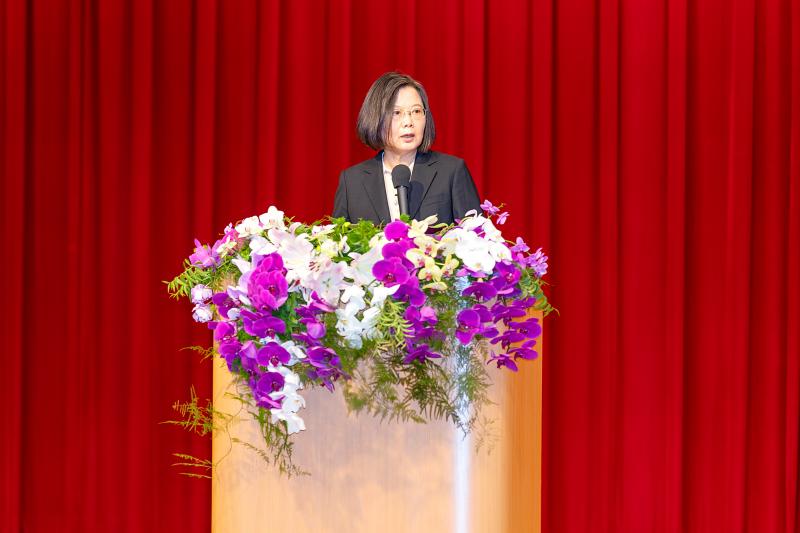President Tsai Ing-wen (蔡英文) yesterday said that Taiwan would not budge “an inch” on issues of sovereign territory and would stalwartly defend its democratic freedoms.
Tsai made the remarks during an inspection of surface-to-air missiles at an air force base in Hualien.
She was accompanied by National Security Council (NSC) Secretary-General Wellington Koo (顧立雄), Minister of National Defense Yen De-fa (嚴德發), Chief of the General Staff Huang Shu-kuang (黃曙光) and Republic of China Air Force Commander Hsiung Hou-chi (熊厚基).

Photo courtesy of the Ministry of Justice’s Investigation Bureau
After attending a briefing, Tsai was given a demonstration of procedures for a missile launch.
Tsai granted the base a one-time subsidy to boost troop morale.
“The most important part of my visit is to thank every one of you, on behalf of Taiwan, for your hard work and dedication,” Tsai said.
The missile units she inspected, while small, had great responsibility, as they are tasked with air defense across northern Taiwan.
They must be combat-ready around the clock and monitor all incoming air traffic, she said, adding that they must be highly adaptable.
Tsai said she is certain that all of the personnel are aware of their responsibility, especially as over the past few days Chinese aircraft have made incursions into Taiwan’s southwestern air defense identification zone.
“It is because of your hard work that our skies remain clear and safe,” Tsai said.
Tsai promised that she would do her best to uphold peace in Taiwan and keep people calm so that professional soldiers would be able to focus on their jobs.
At a Ministry of Justice National Defense Safety Jobs Meeting with Premier Su Tseng-chang (蘇貞昌), Tsai said that the government should adhere to smooth collaboration between the executive and military branches.
The government must identify areas it needs to protect, including the high-tech industry, key infrastructure assets and the nation’s political system, she said.
National security agencies and branches of government must develop a system that will give ample warning of potential problems, which would allow the administration to function in a crisis and to swiftly recover, she said.
The Executive Yuan and the NSC must focus on hiring national security talent, she said.
In related news, a military source said that a reconnaissance vessel of China’s People’s Liberation Army Navy had been spotted off the east coast over the past two days.
The official, who spoke on condition of anonymity, said that military radar detected the vessel about 40 nautical miles (74km) off Hualien County at 4pm on Thursday.
The vessel was seen about 90 nautical miles off Hualien early yesterday, the official said.
It was moving southward, the official said.
The Chungshan Institute of Science and Technology was testing missiles in the area on Wednesday and Thursday.
Additional reporting by Lee Hsin-fang and CNA

MAKING WAVES: China’s maritime militia could become a nontraditional threat in war, clogging up shipping lanes to prevent US or Japanese intervention, a report said About 1,900 Chinese ships flying flags of convenience and fishing vessels that participated in China’s military exercises around Taiwan last month and in January last year have been listed for monitoring, Coast Guard Administration (CGA) Deputy Director-General Hsieh Ching-chin (謝慶欽) said yesterday. Following amendments to the Commercial Port Act (商港法) and the Law of Ships (船舶法) last month, the CGA can designate possible berthing areas or deny ports of call for vessels suspected of loitering around areas where undersea cables can be accessed, Oceans Affairs Council Minister Kuan Bi-ling (管碧玲) said. The list of suspected ships, originally 300, had risen to about

DAREDEVIL: Honnold said it had always been a dream of his to climb Taipei 101, while a Netflix producer said the skyscraper was ‘a real icon of this country’ US climber Alex Honnold yesterday took on Taiwan’s tallest building, becoming the first person to scale Taipei 101 without a rope, harness or safety net. Hundreds of spectators gathered at the base of the 101-story skyscraper to watch Honnold, 40, embark on his daredevil feat, which was also broadcast live on Netflix. Dressed in a red T-shirt and yellow custom-made climbing shoes, Honnold swiftly moved up the southeast face of the glass and steel building. At one point, he stepped onto a platform midway up to wave down at fans and onlookers who were taking photos. People watching from inside

Japan’s strategic alliance with the US would collapse if Tokyo were to turn away from a conflict in Taiwan, Japanese Prime Minister Sanae Takaichi said yesterday, but distanced herself from previous comments that suggested a possible military response in such an event. Takaichi expressed her latest views on a nationally broadcast TV program late on Monday, where an opposition party leader criticized her for igniting tensions with China with the earlier remarks. Ties between Japan and China have sunk to the worst level in years after Takaichi said in November that a hypothetical Chinese attack on Taiwan could bring about a Japanese

The WHO ignored early COVID-19 warnings from Taiwan, US Deputy Secretary of Health and Human Services Jim O’Neill said on Friday, as part of justification for Washington withdrawing from the global health body. US Secretary of State Marco Rubio on Thursday said that the US was pulling out of the UN agency, as it failed to fulfill its responsibilities during the COVID-19 pandemic. The WHO “ignored early COVID warnings from Taiwan in 2019 by pretending Taiwan did not exist, O’Neill wrote on X on Friday, Taiwan time. “It ignored rigorous science and promoted lockdowns.” The US will “continue international coordination on infectious